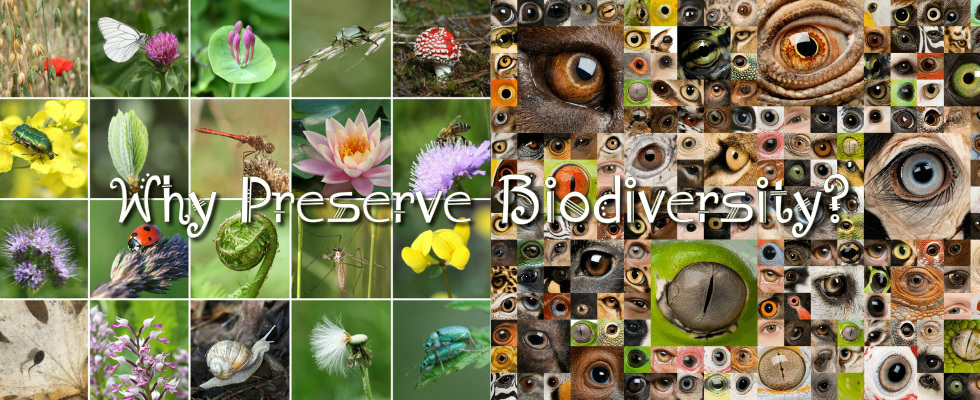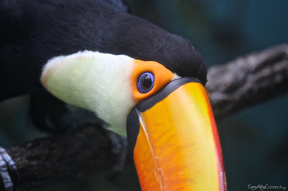
Why Preserve Biodiversity?
Because everything connects. The fate and prosperity of humanity is inextricably connected to the health and balance of the natural world. Every single organism plays a role in its ecosystem that contributes to the overall stability and health of that ecosystem.
We depend on countless species
directly for basic needs such as food, shelter, medicine, pollination and clothing, and on the complex network of all species which is necessary to support those species that we depend on directly. Science is only just beginning to understand the complex and subtle ways that species depend on each other for survival that leads to the intricate interdependency of ecosystems. Maintaining biologically diverse ecosystems will help secure the
indispensable ecosystem services
that are often taken for granted. These include climate regulation, mitigation of floods, food, fresh water, carbon sequestration, purification of water and air, poverty alleviation, nutrient cycling in the soil, wood and fiber, pollination of crops and natural vegetation, fuel, disease management, seed dispersal, aesthetics and spirituality, and prevention of soil erosion. These essential services, effectively provided by healthy ecosystems, are what make our lives possible. A
cascading ripple effect
occurs in an ecosystem when one species goes extinct,
which threatens other species
who depend on that species by potentially affecting their ability to thrive or even survive. An extinction does not need to occur for this effect to take place. A sharp decline in the numbers of a species can be almost as detrimental to an ecosystem as extinction and can severely weaken the entire ecosystem. As the stresses of species loss increase, it
remains a matter of time
until ecosystems reach a breaking point, after which catastrophic collapse is rapid and potentially irreversible. As the
IUCN puts it, "From time immemorial, nature has fed us, cured us, and protected us. But today the roles have switched. We need to feed nature, we need to cure it and protect it if we want to secure a healthy and prosperous future for our children."
Learn more.
According to a
study
published in Nature by an international research team, the loss of biodiversity is as damaging to ecosystems as climate change, pollution and other major forms of environmental degradation, highlighting the need for stronger local, national and international efforts to
protect biodiversity
and the benefits it provides. "Loss of biological diversity due to species extinctions is going to have major impacts on our planet, and we better prepare ourselves to deal with them."
Learn more.
Beauty of Biodiversity


Toucans disperse seeds of fruiting trees. Click to enlarge.
"At least 40 percent of the world’s economy and 80 percent of the needs of the poor are derived from biological resources. In addition, the richer the diversity of life, the greater the opportunity for medical discoveries, economic development, and adaptive responses to such new challenges as climate change."~ Convention of Biological Diversity
| |
“The services and economic value that species provide are irreplaceable and essential to our wellbeing. Unless we live within the limits set by nature, and manage our natural resources sustainably, more and more species will be driven towards extinction. If we ignore our responsibility we will compromise our own survival.” ~ Jon Paul Rodríguez, Deputy Chair, IUCN Species Survival Commission (SSC)
IUCN: Securing the web of life
| |
"Crop wild relatives, such as the Critically Endangered Beta patula , a primary wild relative of cultivated beets, are of vital importance for food security and agriculture as they can be used to produce new crop varieties. It is estimated that crop wild relatives contribute more than US$ 100 billion worldwide towards increased crop yields. Production of at least one third of the world’s food, including 87 of the 113 leading food crops, depends on pollination carried out by insects, bats and birds. This ecosystem service is worth over US$ 200 billion per year. In some countries, medicinal plants and animals form the basis of most of the medicinal drugs people use, and even in technologically-advanced countries like the USA, half of the 100 most-prescribed drugs originate from wild species. Amphibians play a vital role in the search for new medicines as important chemical compounds can be found on the skin of many frogs. Yet 41% of amphibian species are threatened with extinction." ~ IUCN: Securing the web of life
"There's nothing worse for a terrestrial ecosystem than the loss of large mammals -- and the loss of apex predators like sharks, tuna and other large fish will have the same negative impact on the oceans. We're seeing it with the loss of lions and elephants in parts of Africa, as well as in Florida with the decline of panthers. There's no question these losses will have a negative domino effect on our ecosystems." ~ David Steadman, Ornithology Curator at the Florida Museum of Natural History




